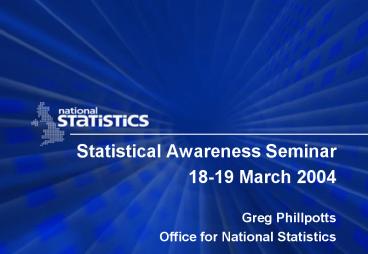Statistical Awareness Seminar PowerPoint PPT Presentation
1 / 21
Title: Statistical Awareness Seminar
1
- Statistical Awareness Seminar
- 18-19 March 2004
- Greg Phillpotts
- Office for National Statistics
2
Welcome
- Fifth seminar
- Wide audience
- Government Offices, Regional Development
Agencies, Local Authorities, Central Government
and more. - Reflects increasing focus on area-based policies,
and need for regional/local information
3
What we are trying to do
- Main aim of seminar
- Help users make best use of Government statistics
- For your benefit, so please ask questions, share
experiences, make contacts and provide feedback - Help us understand what you need
4
Seminar programme - housekeeping
- Fire assembly by Phoenix pub
- Toilets opposite workshop rooms
- Lunch 1230 (1215 tomorrow) in the atrium
- Finish about 445 today
- Tomorrow
- Start 0930 prompt (refresh. from 0900)
- Finish 330
5
Seminar - Organisers
- Making Data Intelligence More Accessible
- Planning Group for Seminar
- Includes ONS, ODPM, DTI, DOH, RCU, DEFRA and GOIN
- Particular thanks to Mike Haslam, Peggy Causer,
Iain Wilson, Peter Gibb, Peter Culver
6
Seminar - Themes
- Making Data Intelligence More Accessible
- Best practice and ONS protocols
- Small area population estimates
- Factfiles and Data mapping
- Measuring regional economic performance
- Housing and migration statistics
7
Seminar - Workshops - 1530 Thursday
- Use of Neighbourhood Statistics DVD/CD resources
- Local Area Labour Market Profiles (NOMIS)
- Quality of life in European Cities
- Knowledge Management
8
Seminar - Demonstrations
- Thursday lunchtime
- Neighbourhood Statistics
- Friday lunchtime
- Dissemination of customised 2001 Census data
9
Regional context
10
Regional and Local statistics
- Link between sub-UK customers and ONS
- sub national reports eg
- Regional Trends (data published 26 February)
- Region in Figures (December 2003)
- Focus on London (June 2003)
- Requirements for regional statistics
- Analysis - including standards, area
classifications... - http//www.statistics.gov.uk/about/methodology_by_
theme/area_classification/
11
Regional statistics agenda
- Government regional economic policy
- Devolution of functions from Whitehall.
- European Union
- Structural funds
- greater analysis at sub-national level
- Government policies relating to inequalities
- Neighbourhood Renewal
12
(No Transcript)
13
ESTABLISHING A PERFORMANCE CULTURE
- 2.5 As well as these weaknesses,the lack of
comprehensive and transparent national data on
the capacity and performance of local public
services required the Government to adopt a
centrally driven approach to reform to inject
ambition and direction into public services. - 2.29 Transparency.Timely,high quality front
line performance data should be widely and
effectively used.This drives success in three
ways. - First,data should be communicated to the public
14
The benefits of data transparency are clear
- 4.13 But to mitigate risk of bureaucracy
- the relationship between necessary internal
management measures and publically available data
must be clarified. Delivery organisations need to
collect robust,timely data to measure their own
performance internally.So long as publically
available data is a sub-set of that,the
additional bureaucracy should be minimised - a clear set of performance indicators in each
service needs to be decided and agreed across
central government,local government and
intermediate tier organisations and the front
line. Standards must be kept constant over time
so that historic comparisons can be made
15
Data transparency - 2
- where multiple central government or other
organisations require data,they should ensure
that their requests are co-ordinated, - data systems needed to transfer and publicise
performance information should be simple,reliable
and efficient.They should also flow directly from
the existing data used within front line
organisations.This does not imply that a high
technology solution is required in the short
term.
16
(No Transcript)
17
9.Need to further develop the evidence base and
its use.
- There is still a poor evidence and factual basis
underpinning much of policy development and
resource allocation. Some parts of the public
sector do not effectively monitor where and on
what their resources are being spent and benefits
they deliver. - Improving the regional policy framework, and
measuring differences relies on high quality
regional data being available. - In recognition of the scope for improving the
quality of regional data, Christopher Allsopp was
asked to review regional information and
statistics.
18
Allsopp Recommendations
- Macro-Regional Data Recommendations
- Gross Value Added /Regional Accounts,
Fundamental survey issues, Labour market,
Population and Prices - Micro-Regional Data
- Delegation to
regional organisations, need for different data
in different regions and standardisation - Statistical Infrastructure
-ONS/GSS presence in
regions and Administrative data - Structural
- Appropriate
coverage of industries
19
Statistical Issues to pick up
- Further analysis of existing data
- linkage of data at regional level eg across
surveys and administrative data - Administrative data - allowing for legal concerns
- but NB quality of addresses
- Comprehensive UK business directory
- Redesign of business surveys
- handling of local and reporting units
- surveys - eg Expenditure and Food, wealth and
assets
20
Allsopp Follow up
- Spending Review Bid
- Work with other government departments to ensure
no gaps/overlaps - Set up arrangements for cross-GSS involvement,
including place of National Statistics Theme
Groups - Regional and Local Division leading
21
Finally...
- Above all - we hope that you enjoy the seminar
- And please ASK QUESTIONS!

